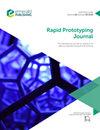Predictive modeling for online in-plane shape deviation inspection and compensation of additive manufacturing
IF 3.6
4区 工程技术
Q1 ENGINEERING, MECHANICAL
引用次数: 0
Abstract
Purpose Limited geometric accuracy is one of the major challenges that hinder the wider application of additive manufacturing (AM). This paper aims to predict in-plane shape deviation for online inspection and compensation to prevent error accumulation and improve shape fidelity in AM. Design/methodology/approach A sequence-to-sequence model with an attention mechanism (Seq2Seq+Attention) is proposed and implemented to predict subsequent layers or the occluded toolpath deviations after the multiresolution alignment. A shape compensation plan can be performed for the large deviation predicted. Findings The proposed Seq2Seq+Attention model is able to provide consistent prediction accuracy. The compensation plan proposed based on the predicted deviation can significantly improve the printing fidelity for those layers detected with large deviations. Practical implications Based on the experiments conducted on the knee joint samples, the proposed method outperforms the other three machine learning methods for both subsequent layer and occluded toolpath deviation prediction. Originality/value This work fills a research gap for predicting in-plane deviation not only for subsequent layers but also for occluded paths due to the missing scanning measurements. It is also combined with the multiresolution alignment and change point detection to determine the necessity of a compensation plan with updated G-code.用于在线平面形状偏差检测和增材制造补偿的预测模型
有限的几何精度是阻碍增材制造(AM)广泛应用的主要挑战之一。本文旨在预测平面内形状偏差,用于在线检测和补偿,以防止误差积累,提高增材制造的形状保真度。设计/方法/方法提出并实现了一种具有注意机制的序列到序列模型(Seq2Seq+ attention),用于预测多分辨率对准后的后续层或被遮挡的刀具轨迹偏差。对于预测的较大偏差,可以执行形状补偿方案。结果提出的Seq2Seq+Attention模型能够提供一致的预测精度。对于检测到的偏差较大的层,提出的基于预测偏差的补偿方案可以显著提高打印保真度。基于膝关节样本的实验,该方法在后续层和闭塞刀具轨迹偏差预测方面都优于其他三种机器学习方法。独创性/价值这项工作填补了预测平面内偏差的研究空白,不仅对后续层,而且对由于缺少扫描测量而遮挡的路径。它还与多分辨率对准和变化点检测相结合,以确定更新g代码的补偿计划的必要性。
本文章由计算机程序翻译,如有差异,请以英文原文为准。
求助全文
约1分钟内获得全文
求助全文
来源期刊

Rapid Prototyping Journal
工程技术-材料科学:综合
CiteScore
8.30
自引率
10.30%
发文量
137
审稿时长
4.6 months
期刊介绍:
Rapid Prototyping Journal concentrates on development in a manufacturing environment but covers applications in other areas, such as medicine and construction. All papers published in this field are scattered over a wide range of international publications, none of which actually specializes in this particular discipline, this journal is a vital resource for anyone involved in additive manufacturing. It draws together important refereed papers on all aspects of AM from distinguished sources all over the world, to give a truly international perspective on this dynamic and exciting area.
-Benchmarking – certification and qualification in AM-
Mass customisation in AM-
Design for AM-
Materials aspects-
Reviews of processes/applications-
CAD and other software aspects-
Enhancement of existing processes-
Integration with design process-
Management implications-
New AM processes-
Novel applications of AM parts-
AM for tooling-
Medical applications-
Reverse engineering in relation to AM-
Additive & Subtractive hybrid manufacturing-
Industrialisation
 求助内容:
求助内容: 应助结果提醒方式:
应助结果提醒方式:


